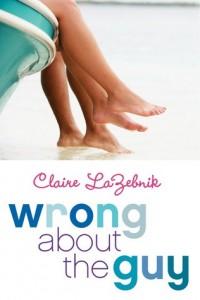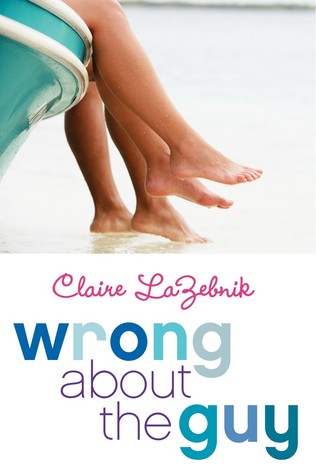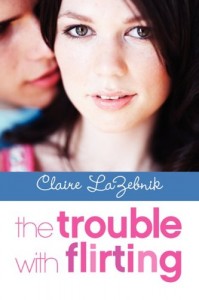Interview: Claire LaZebnik, Author of Wrong About the Guy
Posted on May 20, 2015 at 3:54 pm

The wonderful Claire LaZebnik has written another terrific YA book. This one is Wrong About the Guy, the story of Ellie, a high school senior who lives with her mother, her musician stepfather, who has become unexpectedly famous as the judge of a reality music television series, and her little brother. The book is inspired by Jane Austen’s Emma
, and like Emma, Ellie has a tendency to try to run the lives of everyone around her. Even when her intentions are good, the results are not always what she had in mind.
I loved the book’s heart and humor and I was thrilled to have another chance to interview LaZebnik.
Jane Austen famously said that with Emma she was creating a character that no one would like. Did you think that at times about your main character, Ellie?
You know what’s funny? I loved Ellie from beginning to end. My own teenage daughter is sort of charmingly irreverent and disrespectful (but only when we’re joking around). I saw Ellie as being like that–quick with a funny insult and a little overly confident, but fun to be with, whether you’re another character or a reader. So I’ve been a little surprised when some people who’ve read it have said they didn’t like her. I love her! I love all my heroines, no matter how flawed. But she does get humbled in the course of the book and becomes an even better person by the end.
We hear the story in Ellie’s own voice. As an author, what are the advantages and frustrations of a first-person account?
I love writing in the first person. It feels so much more engaging to me: the reader gets to go through the journey WITH the character, learning things as she does and falling for the same deceptions. But of course it’s frustrating that anything that happens away from the narrator’s presence can only be described to her. Sometimes the most dramatic scenes have to be boiled down to a bit of dialogue because you just can’t justify having the narrator in the room. And the fact that you can’t see into other people’s minds is also limiting. But I’d say the benefits outweigh the frustrations.
Ellie’s privileged life is very different from what she and her single mother had when she was younger. How does that affect her world view?
I wanted her to have clarity about the way people suck up to you when you’re famous and it seemed like she’d have more perspective on it if she hadn’t always lived with it. It made her a little less Emma-like (Emma is very much to the manor born) but more interesting to me as a modern character. She and her mother also aren’t used to being waited on and living in the lap of luxury, so they still appreciate those things and don’t take them for granted. It makes them more relatable.
Because her stepfather is famous and wealthy, she is reluctant to trust some of the kids at school who try to befriend her, and yet is still taken advantage of by one of them. How does that affect her other relationships?
I know some kids out here with famous parents and they really are besieged by attention from people who want access to their house and relatives. It’s a lot of work to sort out the real friends from the ones who are starstruck—and of course it’s not always a simple either/or. You can have a good friend who also gets a thrill from being around your famous father or mother. So it’s complicated. I think you learn to be wary. I explored some of this in my first YA novel EPIC FAIL, where one of the main characters has two movie star parents and is very distrustful of anyone he hasn’t known for years. And in this one, part of the reason Ellie desperately wants her best friend to go to the same college as her is because she wants someone she can trust completely at her side there.
Even though she is careful not to be too trusting in some cases, Ellie misses some important signals of less than trustworthiness in others. What makes her vulnerable to those mistakes?
Ellie’s problem is hubris: she thinks she knows everything. And she does know a lot–she’s actually very smart and fairly intuitive. But her very intelligence makes her overly confident. Once she thinks she’s figured something out, she assumes she’s right and ignores any evidence to the contrary. And that leads her down the wrong path several times in the novel. She also doesn’t like being disagreed with or told she’s wrong—it’s not something she’s used to—so she stops listening when someone tries to point out the flaws in her thinking.
Ellie is in some ways most wrong about herself. How does that crucial rite of adolescence, the college application essay, help her see herself more clearly?
Oh, I had so much fun talking about college essays! I really do think they reflect so much of what teenagers are trying to figure out about themselves and the world in general. Ellie tries to write about her passion for global community work, but eventually her tutor forces her to admit she hasn’t actually done anything to help people who are suffering in other countries. So then she tries writing something that’s more honest, about how she means well, but falls short of her ambition to be a good person. I think that’s true of so many of us: we want to think of ourselves as do-gooders, but we really just sit on the sidelines and try to stay out of trouble. She accepts the reality that she’s not nearly so involved or caring as she likes to think she is, and that makes her resolve to do better in the future.
Ellie’s mother and stepfather have a strong, supportive, close relationship, but it is hard for them to talk about what is going on with their son. Why is that and what role does Ellie play?
Because my own son has autism and I’ve written a couple of books about that, I’ve really studied how families react to concerns about their children. Ellie’s brother is a late talker and often throws tantrums. His mother thinks something must be wrong; his father thinks she’s overreacting. This is really a classic dichotomy: mothers tend to worry and fathers tend to be dismissive. Ellie loves her brother just the way he is, so she sort of agrees with her stepfather that they should just let him be. At the same time, she’s very close to her mother and wants to support her too. She finally realizes that her role is to help both parents really LISTEN to each other. That’s all that matters in the long run. Just listening and working together to figure everything out.
In Austen’s book and in “Clueless,” also inspired by Emma, the main character encourages her naive young friend to pursue a young man named Elton, with disastrous consequences. Your re-interpretation of that part of the plot is very creative! What led you to that variation?
I’m sure you know the Bechdel Test, based on a cartoon strip by the wonderful graphic artist Alison Bechdel. A movie fails the Bechdel test if there isn’t more than one female character, if the women never talk to each other, or if the female characters only discuss men when they DO talk. Even though I was borrowing a lot from Austen, I didn’t want the two young women in my book to spend most of their time talking about men, but I still wanted my main character, Ellie, to steer her naive friend in the wrong direction. So I switched Mr. Elton to Elton College! It’s the school Ellie wants to go to, and she wants her friend to go there too. It’s hard to get into, but Ellie’s a good student and very smart and her stepfather’s famous—she has a good shot at getting in. Her friend, on the other hand, is really out of her league with this school, but Ellie refuses to see that and keeps pushing her to apply early. The storyline follows the arc of the one in Emma, but it’s not about young women pursuing men—it’s about young women trying to figure out the whole college thing.
Did your own experiences as a teenager inspire any part of the story?
For the most part, no—I grew up on the east coast and this is very much a Hollywood novel. The only area that I’d say I drew from my own life for was the discussion about writing college essays. That hasn’t changed much in the last few decades—too many kids still try to sound like someone they’re not in those essays and I think the phoniness will always come through. I actually wrote a humorous essay about being the youngest of five siblings. It was weird and totally personal . . . and I got into to my first choice college. And my son wrote one about his lousy sense of direction. (Also successfully.) So I’m a big fan of doing something weird and unique.



